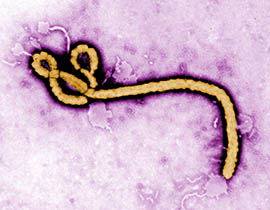TOP: This image from the Centers for Disease Control and Prevention shows the Ebola virus. (CDC Photo)
BOTTOM: Jessica Rigler, chief of the Bureau of Epidemiology and Disease Control at the Arizona Department of Health Services, said state health officials have been sending emails alerting local agencies to facts about Ebola, guidelines for identifying those at risk and what protective equipment is needed to treat someone who’s infected. (Cronkite News Photo by Alicia Canales)
By ALICIA CANALES Cronkite News
PHOENIX – With Texas seeing the nation’s first case of the Ebola virus, health officials say Arizona is prepared in the unlikely event that a case turns up here.
“Diseases are only a plane ride away,” said Jessica Rigler, chief of the Bureau of Epidemiology and Disease Control at the Arizona Department of Health Services.
Ebola, a type of viral hemorrhagic fever that is often fatal in humans, is spread through blood or other body fluids. It has reached epidemic proportions recently in West Africa.
Rigler said state health officials have been sending emails alerting local agencies to facts about Ebola, guidelines from the Centers for Disease Control and Prevention for identifying those at risk and testing for infection and what protective equipment would be needed to treat someone who is infected.
If an Ebola case were to occur in Arizona, a hospital or public health provider would know about it first because the patient would go there first, Rigler said. The physician would assess the signs and symptoms and take into account the patient’s 21-day travel history, whether he or she had been in Africa or whether he or she had been exposed to someone with Ebola.
The patient would be considered a suspect case and put in isolation pending blood tests. Those providing care would wear protective clothing.
The Maricopa County Department of Public Health is on alert for any cases that may arise, said Jhoana Molina, a spokeswoman for the department’s Office of Preparedness & Response.
“We’re just in guidance of the state, and we’re in surveillance mode,” Molina said.
A county health department will also find out who an Ebola patient has been in contact with and monitor those people for 21 days for signs and symptoms of Ebola. The intensity of monitoring will depend on whether that contact may have had contact with the patient’s bodily fluids.
Aaron Pacheco, program coordinator for the public health emergency preparedness program for Pima County Health Department, said this is a similar process to when there are other contagious diseases in the area.
“‘Where was this person, who was this person in contact with?’” Pacheco said. “In partnership with the hospitals and state health department, we start an investigation to better understand what the risk to rest of public might be.”
Rigler said the protocols and procedures set for Ebola are already things the department does for other diseases. The Arizona public health system infrastructure will help prevent and control an outbreak, she said.
“Arizona is definitely prepared for this,” Rigler said. “That’s something I can’t emphasis enough is that a response to Ebola looks very similar to a response to other infectious diseases that we deal with on a daily basis in hospitals and in the public health system.”
EBOLA SIGNS AND SYMPTOMS
• Unexplained bleeding or bruising (hemorrhage)
• Fever greater than 101.5 degrees
• Severe headache
• Vomiting
• Diarrhea
• Muscle pain
• Weakness
• Stomach pain
Source: Centers for Disease Control and Prevention










No comments:
Post a Comment